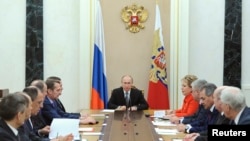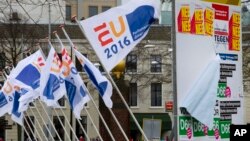In an April 6 referendum in the Netherlands, a majority of participants voted against approving an association agreement between the European Union and Ukraine. The results were greeted with concern in the West, but with delight in Moscow.
Russia's government saw the vote as evidence that it was “on the same page” with Europe’s far right – in this case, the Freedom Party headed by Geert Wilders, the Dutch politician known for his opposition to Islam and immigration who hailed the referendum’s “no” vote as “the beginning of the end of the EU.”
The Dutch referendum was just the latest in a series of developments that have journalists and researchers from around the world taking a closer look at how European radical organizations – most of them on the right side of the political spectrum, but also some on the left – are connected to the administration of Russian President Vladimir Putin.
Is it simply a coincidence that many of these organizations supported the Kremlin’s actions against Ukraine? According to researchers, the answer is no: radicals in Europe, together with some cynically-minded mainstream politicians, are close to Russia’s current leaders, both ideologically and financially.
Money trail
For example, in 2014, the leader of France’s National Front, Marine Le Pen, admitted her far-right party had taken an $11-million loan from Russian-owned First Czech-Russian Bank.
Le Pen’s “lieutenants have been to Moscow many times and met people there, and it’s very clear there’s an open financial connection, and also some intellectual support,” Washington Post columnist Anne Applebaum told VOA’s Russian Service, adding that there are also direct connections between Hungary’s far-right Jobbik party and Russia. “One of its members has deep and long Moscow links,” she said.
According to Applebaum, there are also “indirect” links between Europe’s far right and Moscow. “For example, there have been conferences organized with Russian money which the leaders of these right-wing groups attend,” she said.
Such links were also on display during the November 2014 elections in eastern Ukraine, which were organized by Russia-backed separatists in the region. A number of Europe’s far-right parties, along with Greece’s Communist Party, agreed to send monitors to observe that vote, which Western governments dismissed as illegitimate.
“The third kind of link is intellectual,” said Applebaum. “It’s one that we saw in the recent Dutch referendum, whereby a right-wing party borrows liberally from Russian propaganda and Russian-manufactured disinformation in a local political dispute.”
Applebaum said Moscow supports Europe’s far-right in hopes of weakening European organizations and institutions that it "perceives as a threat.” She added, however, that such actions will not ultimately benefit Russia as a country.
“Russia, in my view is a European country,” she said. “It should be trying to join Europe and strengthen it, and I don’t see what Russia gains by trying to destroy Europe.”
‘Divide and split’
David Kramer, senior director for Human Rights and Democracy at the McCain Institute for International Leadership, a Washington-based research institution, told VOA he did not think that Russian actions were decisive to the outcome of the Dutch referendum.
“Russia is exploiting Europe’s divisions and disagreements, though I think it goes too far to say that Russian propaganda had a significant impact on the Dutch referendum’s outcome,” he said. “The vote frankly was more about Dutch views toward the EU, and the referendum on Ukraine and the EU got caught up in that. Still, the result was a major boost for Putin and a big blow to Ukraine.”
More broadly, Moscow is trying to “to divide and split Europe,” according to Kramer.
“And Europe is giving Russia openings to do this,” he said. “That it is not a source of deep shame and embarrassment that a major French political party can openly ask for Russian funding – and that would be illegal in the U.S., by the way – says a lot. Putin’s greatest export is corruption, and the West imports it. We need to do a better job of blocking Russian money and its corrupting influence. I am more worried about that than I am about Russian propaganda.”
Boris Reitschuster, a former Moscow correspondent for the German news magazine Focus and author of a book titled "Putin's Hidden War,” has investigated the connections between Germany’s far right and the Kremlin and its ideological representatives.
He told VOA that German rightists have direct connections with the Russian government, with people who used to work for the Stasi, the former East German communist secret police, and with Russian “friends” of the Putin government like the ultra-nationalist political scientist Alexander Dugin and Konstantin Malofeyev, a far-right billionaire who is said to have provided funds for the separatists in eastern Ukraine.
KGB methods
Moscow, said Reitschuster, has long been working to increase its influence on political life in Germany. "I think it started shortly after Putin came to power,” he said. “He was a KGB man, and everything he is using now is the old methods of the KGB and the Stasi.” Russia’s annexation of Crimea in 2014 was a “watershed,” he added, “as if, before that, something had been created but was in sleep mode, and suddenly was turned on.”
According to Reitschuster, several German right-wing parties have “clear” links to Moscow. One is Alternative for Germany, which won 4.7 percent of the votes in the 2013 German federal election, just short of the 5 percent electoral threshold to gain seats in the Bundestag. Another is the National Democratic Party of Germany, whose former leader, Udo Voigt, participated in a congress of European ultra-right radicals held in St. Petersburg in March 2015. Voigt is currently a member of the European Parliament.
There is also “a whole network” of right-wing German websites and media with connections to Russia, said Reitschuster. “I think it is impossible to believe that this is a coincidence.”
Still, Reitschuster believes Russian meddling in German affairs will ultimately backfire.
“In the long run, this could help Germany, because I think we will survive such an assault and that it, on the contrary, will help strengthen our patriotic spirit, strengthen our understanding of how important our freedom is,” he said.






